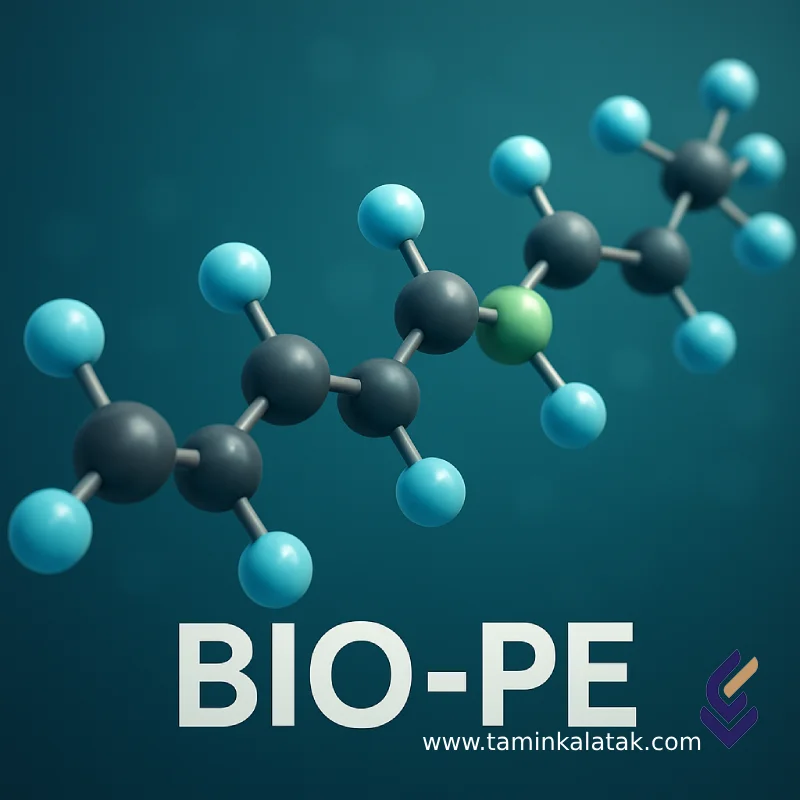Polymers are made up of very large molecules made up of many repeating units called monomers, which ultimately form this long polymer chain
Biobased PolyEthylene (Bio-PE)
Bio-based polyethylene is a type of “green” polyethylene produced from renewable resources like sugarcane or corn instead of crude oil. This material possesses the same physical and chemical properties as conventional polyethylene but offers greater environmental sustainability, playing a key role in the path toward sustainable development.
Structure of Bio-based Polyethylene
Bio-based polyethylene has a molecular structure identical to that of conventional polyethylene and is made from the ethylene monomer (C₂H₄). The difference lies in the source of this ethylene:
- In conventional polyethylene: Ethylene is derived from petroleum or natural gas.
- In bio-based polyethylene: Ethylene is produced from bio-ethanol obtained through the fermentation of sugarcane or corn.
The result of this process is a material that is technically identical in performance to traditional polyethylenes such as HDPE, LDPE, and LLDPE.
Features of Bio-based Polyethylene
- Identical chemical structure to petroleum-based polyethylenes.
- Recyclable and reusable.
- Reduced greenhouse gas emissions compared to fossil-based polyethylene.
- Excellent resistance to moisture and chemicals.
- Compatible with existing manufacturing machinery and processes (injection molding, extrusion, molding).
Applications of Bio-based Polyethylene
- ✅ Food Packaging: Bottles, bags, plastic films.
- ✅ Agricultural Products: Mulch films, seed packaging.
- ✅ Cosmetics and Personal Care Products.
- ✅ Disposable Medical Equipment.
- ✅ Automotive Industry: Lightweight and flexible components.
Disadvantages of Bio-based Polyethylene
- Higher price due to limited production and the cost of biological resources.
- Competition with food sources (when using sugarcane or corn).
- In some cases, lower thermal stability than fossil-based polyethylene.
- It is not biodegradable, although its origin is biological.
Advantages of Bio-based Polyethylene
- Renewable source and not dependent on crude oil.
- Significant reduction in CO₂ emissions over the product’s life cycle.
- Performance identical to traditional polyethylenes.
- Enhances product branding as environmentally friendly.
- Suitable for use in green policies and international environmental standards.
Applications
| Applications | , , , , , |
|---|
Biobased PolyEthylene (Bio-PE)
| Products | Grid | Melt Flow Index (MFI) (g/10 min) | Density (g/mm³) | Process method | Applications |
|---|---|---|---|---|---|
| Lightweight bio-based polyethylene | Bio-LDPE 18E | 18,00 | 918,00 | Extrusion, film making | Soft packaging, agricultural films, food product coatings |
| Heavy duty biological polyethylene | Bio-HDPE 50N | 7,00 | 955,00 | Injection, body blowing | Bottles, hard containers, industrial caps |
| Linear light biological polyethylene | Bio-LLDPE 20B | 2,00 | 925,00 | Filmmaking, casting | Flexible packaging, industrial bags, food wrappers |
| Special biological polyethylene | Bio-PE Flexible 5 | 5,00 | 915,00 | Injection molding | Disposable medical products, sanitary ware, flexible parts in the automotive industry |







